
International Journal of Mental Health and Addiction
Scope & Guideline
Championing Research Excellence in Mental Health
Introduction
Aims and Scopes
- Focus on Addictive Behaviors:
The journal emphasizes research on various forms of addictive behaviors including substance use disorders, behavioral addictions (like gaming and gambling), and their psychological underpinnings. - Interdisciplinary Approaches:
It encourages interdisciplinary research that integrates perspectives from psychology, psychiatry, sociology, and public health to provide comprehensive insights into mental health and addiction. - Cultural and Contextual Variability:
The journal addresses cultural differences and contextual factors influencing mental health and addiction, promoting studies that consider diverse populations and settings. - Innovative Methodologies:
The journal supports the use of advanced research methodologies, such as network analysis, machine learning, and longitudinal studies, to enhance the understanding of complex interactions in mental health and addiction. - Focus on Prevention and Intervention:
Research focused on effective prevention strategies and interventions for mental health issues and addiction is a core area, emphasizing practical applications of findings.
Trending and Emerging
- Digital and Online Addictions:
There is a growing focus on digital and online addictions, particularly in the context of gaming, social media, and internet use, reflecting societal shifts towards increased screen time. - Impact of COVID-19 on Mental Health:
Research examining the effects of the COVID-19 pandemic on mental health, substance use, and coping mechanisms has surged, highlighting the pandemic's profound and lasting impact. - Intersectionality in Mental Health and Addiction:
Emerging studies are increasingly considering intersectionality, exploring how various social identities (such as race, gender, and socioeconomic status) intersect to affect mental health and addiction outcomes. - Psychosocial Factors and Resilience:
There is a trend towards investigating psychosocial factors, including resilience and social support, that influence mental health and substance use, emphasizing the role of interpersonal relationships. - Innovative Treatment Approaches:
Research on novel treatment modalities, including mindfulness-based interventions and digital mental health solutions, is gaining traction, reflecting a shift towards innovative and accessible mental health care.
Declining or Waning
- Traditional Substance Use Disorders:
While substance use disorders remain a significant focus, there has been a noticeable decline in studies solely dedicated to traditional substance use without considering co-occurring disorders or broader social contexts. - Generalized Studies on Mental Health:
Research that broadly examines mental health without specific ties to addiction or behavioral issues appears to be less frequent, as the journal shifts towards more targeted studies. - Single-Disorder Focus:
There is a waning interest in studies that focus exclusively on one type of disorder (e.g., only depression or only anxiety), with a greater emphasis now on the interplay between multiple disorders. - Non-Empirical Research:
The journal has increasingly prioritized empirical studies over theoretical papers or opinion pieces, leading to a reduction in non-empirical contributions.
Similar Journals

Addiction Science & Clinical Practice
Unlocking the potential of addiction science for all.Addiction Science & Clinical Practice is a premier open-access journal dedicated to advancing the understanding and treatment of addiction through evidence-based research and clinical practice. Published by BMC in the United Kingdom since 2007, this journal has significantly impacted the fields of Clinical Psychology, Medicine, and Psychiatry and Mental Health, proudly securing a Q1 ranking in multiple categories as of 2023. With an emphasis on high-quality research, the journal provides an inclusive platform for the dissemination of innovative findings and clinical insights that address the complexities of addiction. Researchers, practitioners, and students alike benefit from its unrestricted access since 2012, allowing for widespread dissemination of knowledge. Located at CAMPUS, 4 CRINAN ST, LONDON N1 9XW, the journal continues to lead the way in fostering collaboration and informing best practices in addiction science.
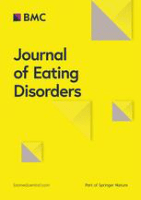
Journal of Eating Disorders
Exploring the complexities of eating disorders.Journal of Eating Disorders, published by BMC, is a leading Open Access journal dedicated to advancing knowledge and understanding of eating disorders. With an ISSN of 2050-2974, it has been a valuable resource for researchers and practitioners since its inception in 2013. This journal resides in the prestigious United Kingdom and provides a platform for high-quality research, encompassing areas such as behavioral neuroscience, nutrition and dietetics, as well as psychiatry and mental health. Notably, it achieved an impressive Q1 ranking in Nutrition and Dietetics and holds a Q2 classification in both Behavioral Neuroscience and Psychiatry and Mental Health for the year 2023. With a robust Scopus ranking, including a 67th percentile in Psychiatry and Mental Health, the journal is committed to facilitating vital discourse and disseminating groundbreaking findings that cater to both academic and clinical settings. The wide-reaching impact of the research published within its pages makes it an essential tool for professionals, students, and anyone with an interest in understanding and addressing eating disorders.
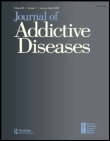
JOURNAL OF ADDICTIVE DISEASES
Pioneering Research in Addiction and RecoveryJOURNAL OF ADDICTIVE DISEASES, published by ROUTLEDGE JOURNALS, TAYLOR & FRANCIS LTD, serves as a pivotal platform for researchers, clinicians, and students in the realms of clinical psychology, psychiatry, and addiction studies. With a distinguished history dating back to its inception in 1991, this journal spans critical research developments with its current scope covering converged years from 2018 to 2024, ensuring a robust repository of knowledge. Notably, it holds a respectable impact factor and is categorized in Q2 quartiles across several disciplines including Clinical Psychology, Medicine (miscellaneous), and Psychiatry and Mental Health for 2023, reflecting its impactful contributions to the scientific community. Despite the journal not currently offering Open Access, it remains highly ranked, occupying positions in the top percentiles of Scopus rankings. This journal emphasizes the importance of disseminating high-quality research focused on addictive behaviors and diseases, thereby addressing vital clinical and public health challenges.
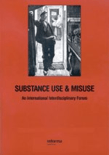
SUBSTANCE USE & MISUSE
Advancing knowledge on substance use and its societal impact.SUBSTANCE USE & MISUSE, published by Taylor & Francis Inc, is an esteemed academic journal dedicated to the multifaceted study of substance use and its implications on health and society. With a notable impact factor and categorized in the Q2 quartile across multiple fields—including Health (Social Science), Medicine (Miscellaneous), Psychiatry and Mental Health, as well as Public Health—this journal serves as an essential platform for researchers, professionals, and students alike. Spanning from 1966 to 2024, it provides a rich archive of peer-reviewed articles that explore current trends, innovative research, and evidence-based practices in the management and understanding of substance use. The journal offers various access options, catering to the diverse needs of its audience and affirming its commitment to fostering scholarly discourse in the United Kingdom and beyond. By engaging with this journal, readers can enhance their understanding of the complexities surrounding substance use, making it a crucial resource for advancing knowledge and informing policy in this critical area of public health.

Adicciones
Fostering dialogue to enhance public health strategies.Adicciones is a prominent academic journal dedicated to the fields of Medicine and Psychiatry, focusing on the multi-faceted issues surrounding addiction and substance use. Published by SOCIDROGALCOHOL in Spain, this journal has been a critical resource for researchers, clinicians, and students since its inception in 1994, with a commitment to advancing knowledge in addiction science for the benefit of public health. With an impressive impact factor that places it in the Q3 category of both Medicine (Miscellaneous) and Psychiatry and Mental Health according to 2023 rankings, Adicciones is recognized for its high-quality peer-reviewed articles that contribute to the ongoing dialogue in these vital fields. Although not currently an open-access journal, it provides valuable subscription-based access to its extensive repository of research findings and reviews, fostering a deeper understanding of the complex dynamics of addiction. The journal's continued relevance is underscored by its convergence into 2024, promising ongoing contributions that inspire new ideas and practices to combat addiction.

Current Addiction Reports
Driving innovation in addiction treatment methodologies.Current Addiction Reports, published by SPRINGERNATURE, is a leading journal dedicated to the comprehensive study of addiction in its various dimensions, with a particular focus on the latest clinical developments and research in Clinical Psychology and Psychiatry and Mental Health. Since its inception in 2014 and through to 2024, the journal has established itself as a pivotal resource for researchers, professionals, and students alike, currently holding a prestigious Q1 ranking in both relevant categories. With an impressive Scopus rank of #46 in Clinical Psychology and #129 in Psychiatry and Mental Health, it occupies a significant position within the field, reflecting its commitment to high-quality scholarship and impactful findings. The journal offers open access options, ensuring that vital research is readily available to a global audience. By fostering a deeper understanding of addiction trends and innovative treatment methodologies, Current Addiction Reports plays an essential role in advancing knowledge and improving clinical practices.
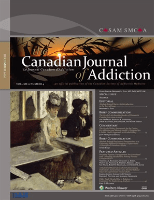
Canadian Journal of Addiction
Exploring the complexities of addiction research.Canadian Journal of Addiction is a leading platform dedicated to advancing the understanding of addiction and its multifaceted impacts on individuals and society. Published by LIPPINCOTT WILLIAMS & WILKINS, this journal aims to foster rigorous research and discussion in the field of addiction studies, contributing significantly to the intersection of psychiatry and mental health. With its ISSN 2368-4720 and E-ISSN 2368-4739, the journal is indexed in Scopus and has been categorized in the Q3 quartile for 2023, reflecting its emerging influence amongst peers. The Canadian Journal of Addiction facilitates a vital exchange of ideas and findings, crucial for researchers, practitioners, and students alike, addressing pressing issues related to addiction through innovative studies and insightful reviews. Subscribers and readers benefit from the latest findings as they navigate through the dynamic landscape of addiction research, enriching both academic knowledge and practical applications.
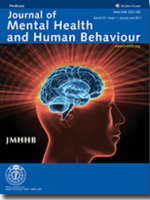
Journal of Mental Health and Human Behaviour
Connecting global minds to foster mental well-being.The Journal of Mental Health and Human Behaviour is a distinguished publication dedicated to advancing the field of mental health, focusing on innovative research and practical applications that enhance human behaviour and overall well-being. Published by WOLTERS KLUWER MEDKNOW PUBLICATIONS, this journal has been an open-access platform since 2014, enabling wider dissemination of knowledge and fostering collaboration among researchers, professionals, and students globally. With an ISSN of 0971-8990 and E-ISSN 2543-1897, it aims to provide a comprehensive array of peer-reviewed articles that cover various facets of mental health, including psychological theories, therapeutic practices, and sociocultural influences. The journal plays an integral role in bridging the gap between research and practice, making it essential for those who are committed to improving mental health outcomes and advocating for human behaviour change. Published in India, the journal not only highlights regional issues but also contributes to international discussions on mental health trends and interventions, affirming its importance in a rapidly evolving field.
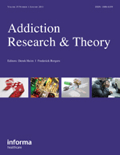
ADDICTION RESEARCH & THEORY
Pioneering Theories, Empowering Change.ADDICTION RESEARCH & THEORY, published by Taylor & Francis Ltd, is a leading academic journal dedicated to advancing the understanding of addiction through innovative research and theoretical frameworks. With its ISSN 1606-6359 and E-ISSN 1476-7392, this journal serves a diverse audience, including researchers, healthcare professionals, and students in the field of medicine. The journal, classified in the Q2 category of Medicine (Miscellaneous) as of 2023, and ranking in the 76th percentile in Scopus, demonstrates a robust impact within the community, reflecting its commitment to high-quality research and discourse. With publications spanning from 1993 to 2024, ADDICTION RESEARCH & THEORY aims to provide a comprehensive platform for the latest empirical studies, critical reviews, and theoretical discussions on addiction, making it essential for anyone engaged in this vital area of health and social issues. Although it does not currently offer Open Access options, the journal remains a critical resource for scholarly communication, contributing significantly to the fields of addiction medicine and psychiatry.
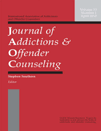
JOURNAL OF ADDICTIONS & OFFENDER COUNSELING
Transforming Lives Through Insightful ResearchJOURNAL OF ADDICTIONS & OFFENDER COUNSELING, published by Wiley, serves as a critical platform for interdisciplinary research at the intersection of psychology, law, and social issues related to addictions and criminal behavior. With a commitment to excellence since its inception in 1990, this journal boasts an impressive Scopus rank within the top quartiles of its fields—ranking Q2 in Law and Q3 in both Clinical and Social Psychology as of 2023. While currently not designated as an Open Access publication, it provides a wealth of peer-reviewed articles that promote the understanding and counseling of offenders, making it invaluable for researchers, practitioners, and students alike. The journal addresses critical contemporary issues, fostering discussions that influence policy and therapeutic practices, ensuring its vital role in advancing knowledge and effective interventions in addiction and offender counseling.